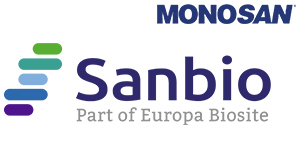Mouse anti-PSMA Purified, clone GCP-04 (Monoclonal)
Mouse anti-PSMA Purified, clone GCP-04 (Monoclonal)
SKU
SANMON23301
Packaging Unit
0,1 mg
Manufacturer
Sanbio / Monosan
Availability:
loading...
Price is loading...
Clone Number: GCP-04
Immunogen: Recombinant fragment of human GCPII (amino acids 44-750) produced in S2 cells
Concentration: 1 mg/ml
Format: Purified by protein-A affinity chromatography.
Storage buffer: Phosphate buffered saline (PBS), pH 7.4, 15 mM sodium azide
Additional info: Glutamate carboxypeptidase II (GCPII), also known as N-acetyl-alpha-linked acidic dipeptidase I (NAALADase I), folate hydrolase (FOLH1), and prostate-specific membrane antigen (PSMA), is an approximately 95-110 kDa type II transmembrane glycoprotein expressed in various tissues. In nervous system GCPII cleaves abundant N-acetylaspartylglutamate, which is released from neurons in a calcium-dependent manner, to N-acetylaspartate and glutamate. As immoderate glutamate concentration is neurotoxic, GCPII contributes to pathological conditions regarding e.g. Alzheimer´s disease, Huntington´s disease, epilepsy, schizophrenia, stroke or neuropathic pain and appears to be an interesting therapeutic target. In jejunum GCPII hydrolyzes pteroylpoly-gamma-glutamate to folate and glutamate, enabling folate to be absorbed by gastrointestinal tract. GCPII, which is present in a number of tissues at low levels, is overexpressed in neovasculature of most solid tumours and is a target enzyme for diagnosis and treatment of prostate cancer. Normal human prostate express more mRNA coding for a cytosolic GCPII form truncated at the N-terminus (PSM´) than mRNA for membrane-bound GCPII, and this ratio is reversed upon malignant transformation.SpecificityThe mouse monoclonal antibody EM-53 recognizes RLTPR / CARMIL2, an intracellular protein playing a role in actin filament elongation.Application detailsWestern blotting: Recommended dilution: 1 μg/ml; positive control: LNCaP cell line. Sample preparation: Resuspend approx. 50 mil. cells in 1 ml cold lysis buffer (1% NP-40). Incubate 30 min on ice. Mix lysate with non-reducing/reducing Laemmli SDS-PAGE sample buffer. Both reducing and non-reducing conditions.
Immunogen: Recombinant fragment of human GCPII (amino acids 44-750) produced in S2 cells
Concentration: 1 mg/ml
Format: Purified by protein-A affinity chromatography.
Storage buffer: Phosphate buffered saline (PBS), pH 7.4, 15 mM sodium azide
Additional info: Glutamate carboxypeptidase II (GCPII), also known as N-acetyl-alpha-linked acidic dipeptidase I (NAALADase I), folate hydrolase (FOLH1), and prostate-specific membrane antigen (PSMA), is an approximately 95-110 kDa type II transmembrane glycoprotein expressed in various tissues. In nervous system GCPII cleaves abundant N-acetylaspartylglutamate, which is released from neurons in a calcium-dependent manner, to N-acetylaspartate and glutamate. As immoderate glutamate concentration is neurotoxic, GCPII contributes to pathological conditions regarding e.g. Alzheimer´s disease, Huntington´s disease, epilepsy, schizophrenia, stroke or neuropathic pain and appears to be an interesting therapeutic target. In jejunum GCPII hydrolyzes pteroylpoly-gamma-glutamate to folate and glutamate, enabling folate to be absorbed by gastrointestinal tract. GCPII, which is present in a number of tissues at low levels, is overexpressed in neovasculature of most solid tumours and is a target enzyme for diagnosis and treatment of prostate cancer. Normal human prostate express more mRNA coding for a cytosolic GCPII form truncated at the N-terminus (PSM´) than mRNA for membrane-bound GCPII, and this ratio is reversed upon malignant transformation.SpecificityThe mouse monoclonal antibody EM-53 recognizes RLTPR / CARMIL2, an intracellular protein playing a role in actin filament elongation.Application detailsWestern blotting: Recommended dilution: 1 μg/ml; positive control: LNCaP cell line. Sample preparation: Resuspend approx. 50 mil. cells in 1 ml cold lysis buffer (1% NP-40). Incubate 30 min on ice. Mix lysate with non-reducing/reducing Laemmli SDS-PAGE sample buffer. Both reducing and non-reducing conditions.
| SKU | SANMON23301 |
|---|---|
| Manufacturer | Sanbio / Monosan |
| Manufacturer SKU | MON23301 |
| Package Unit | 0,1 mg |
| Quantity Unit | STK |
| Reactivity | Human, Mouse (Murine), Rat (Rattus), Pig (Porcine) |
| Clonality | Monoclonal |
| Application | Immunohistochemistry (paraffin), Western Blotting, Immunocytochemistry |
| Isotype | IgG1 |
| Host | Mouse |
| Conjugate | Unconjugated |
| Product information (PDF) |
|
| MSDS (PDF) |
|

 Deutsch
Deutsch







